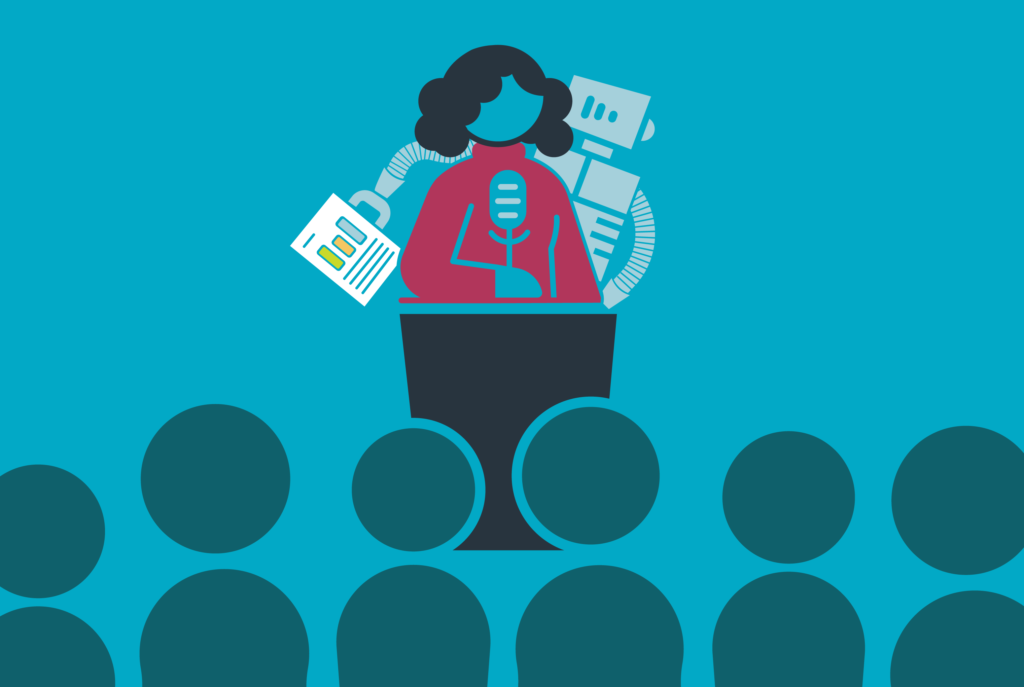If your social feeds look anything like mine, you’ve been flooded with content about ChatGPT. Commentary ranges from the exultant disruptors gleefully shouting, “AI will replace humans on so many tasks,” to troubled moderates calling for everyone to simmer down and focus on the risks.
As we all know, artificial intelligence (AI) is not a new concept. The building blocks of artificial intelligence first emerged during World War II, and AI has been the subject of countless movies and books since the 60s—up to and including the fabulous “The Mitchells Versus the Machines” released in 2021.
The massive growth and innovation we’ve seen in the last decade or so has resulted in the capability explosion we’re seeing today. I recently read an analogy from Hubspot CTO Dharmesh Shah who so succinctly put ChatGPT into powerful context:
“Netscape was to the internet what ChatGPT is to artificial intelligence. The internet existed before Netscape, but the browser helped millions of mere mortals connect the dots on what could be done, and dream of what could be.”
—Dharmesh Shah, CTO Hubspot, December 2022 [LinkedIn]
So as we think about what could be, and as I live in that intersection between art (communication) and science (data analytics), the question on my mind has been, will AI help us to better translate data for business? Can AI tell a compelling data story?
The shorter answer, on both parts, is yes. But also no.
AI encourages us to be more creative
We can say with a high degree of confidence that AI can elevate the analytic process. Not only does it have the potential to radically improve the data collection and cleansing processes, but rich algorithms can also uncover patterns and trends in large, complex datasets that may take human analysts significantly longer to discover (if they discover them at all).
Which means AI gets us to the good stuff faster.
And, because AI has the potential to identify patterns of interest to the user, I can see a future where AI can not only generate the findings but create an opening narrative based on objectives and strategies. That’s a pretty exciting proposition, because it can free up analyst time to explore more complex issues, ask deeper questions and plan or execute on strategies and tactics.
But it’s also a bit terrifying—because, as Voltaire once said (or Spider-Man’s uncle, if you want a more recent reference), “With great power comes great responsibility.”
AI will force us to become better critical thinkers
Let’s be real: AI is a powerful tool, but it’s still just a tool. And as with any tool, its power is in the hands of those who wield it.
Algorithms and models are only as good as what has been fed into them. AI is a powerful tool to support better data storytelling, but I don’t believe it should be seen as a replacement for human intuition or creativity.
It’s up to humans to decide how and when to use tools and apply outputs. The data storyteller steps in once the model is complete, to think critically about the output to ensure results are accurate, meaningful and relevant. Wait, scratch that—that’s not a strong enough statement. It’s crucial that the data storyteller has a strong understanding of the tools to convey the context and nuances of the data.
AI can start the story but we still need the human connection
Keeping our attention focused on analyses that help businesses to be successful, the ability to effectively communicate and interpret data for any operation is a critical skill. And one that requires a deep understanding of both the data and the audience.
Regardless of the output, it’s ultimately up to the data storyteller to craft a compelling narrative and communicate effective, actionable insights derived from the data. Engagement, inspiration, empathy—all innately human traits that are needed to really land a message and open up the conversation about what’s next.
Critical thinking and communication will rapidly become necessary skills in this environment, as findings that come out of analyses will require humans to act on them. The message needs to land with humans, and humans are best positioned to be creative, empathetic and nimble. They also need to be attuned to the unspoken behaviour in a room in order to have a message land, and to get an audience to align on a decision and action plan.
At the end of the day, I’m really excited about what AI can bring to data storytelling. At the risk of being too philosophical, I think what we’re experiencing today will go down in history as the moment we firmly stepped into the fifth industrial revolution – a time of synergistic collaboration between human and machine, rather than competition.
If you haven’t yet embraced the need to develop your data storytelling skills, let this be your siren call. AI is going to have a significant impact on the ways we work with and apply data across the board. But it will never be the final answer. The time is now to get ready – to use data to find and present creative, critical considerations, and to make your message land with decision makers.
“Workshop was great, I will be putting these strategies into practice. Thank you!”
–Halton Region, 2023
Storylytics can help you land your message with decision makers and influencers. Contact us for an assessment on where you are today, learn how to upskill your team and much more.
